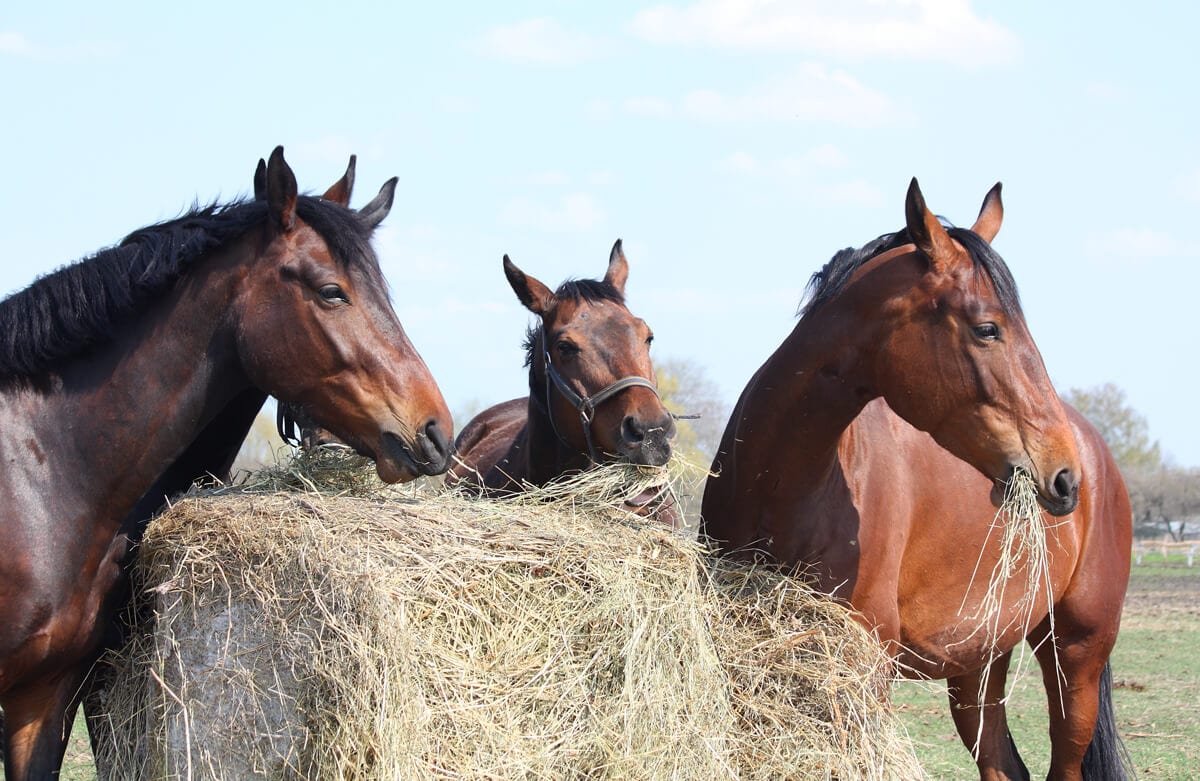Follow Your Gut: Omega-3s and the Equine Microbiome
You’re not alone. No, really: You’re not. Both you – and your horse – carry trillions of bacteria in your intestinal system.
These tiny team players compose what is known as the ‘microbiome,’ a bacterial community established primarily in the gut whose diversity and roles are integral to helping horses and humans function at their best.
Why Is the Microbiome Important?
The microbiome is essential for the health of all mammals. Among its many roles, this bacterial community converts food into energy, breaks down toxins, manufactures nutrients, manages weight and supports the immune system.
The microbiome, however, can also become disturbed when certain bacterial populations become more or less dominant, or as overall diversity diminishes. Researchers are finding that when the bacterial makeup of the microbiome changes, it can result in a variety of diseases, including colic, colitis, equine grass sickness, foal heat diarrhea, and laminitis (1).
Numerous factors influence the microbiome: antibiotics and medicines, age, breed, environment, exercise, and of course diet, to name a few (2). On the diet front, certain types of foods and nutrient groups seem to be especially important for maintaining a healthy microbial population, including (you guessed it) omega-3 fatty acids.
How Do Omega-3s Impact the Microbiome?
Animal studies indicate that omega-3s influence the microbiome in a number of ways:
Research has demonstrated that higher intakes of omega-3s, like those found in Wellpride are linked to greater microbial diversity (3, 4). Other studies have also shown that omega-3 supplementation can help restore a disturbed gut microbiota community (5), as well as increase the production of short-chain fatty acids in the body (4). Since short-chain fatty acids feed the cells lining the gut, they are important for maintaining the integrity of the intestinal wall.
Finally, the two main workhorses of the omega-3 family, EPA and DHA, also appear to influence the two-way biochemical signaling process that takes place between the gastrointestinal tract and the central nervous system (the ‘gut-brain axis’). The ‘gut-brain axis’ in turn regulates many physiological functions, including neurodevelopment, behavior and the body’s stress response (4).
Omega-3s appear to be so instrumental to microbial health that when a mammal doesn’t get enough omega-3s, the microbiome can become disturbed (6). Some scientists also postulate that the omega-3s’ impact on the microbiome could in part explain the benefits these fatty acids have for a variety of diseases and chronic health issues (4, 7).
How Do Horses Get Omega-3s?
Omega-3s are important for every cell in the body; however, because the body does not produce these fatty acids by itself, they must be obtained through diet or supplementation. While certain types of grass contain small amounts of omega-3s, grass contains almost exclusively alpha-linolenic acid (ALA) — not the two types of omega-3s best associated with microbial health (EPA and DHA) (8). Moreover, forage such as hay will over time lose much of its omega-3 content. When horses are in addition fed with processed feeds rich in pro-inflammatory omega-6s fatty acids, this can tip the balance towards omega-3 deficiency.
In the ‘big picture,’ there’s nothing ‘micro’ about the impact microbiomes have on the overall quality of your horse’s life and performance.
Wellpride’s omega-3 oil is produced using fresh fish oil rich in EPA and DHA. Purified of mercury and pesticides, Wellpride can be used alone or with other supplements or medications while benefiting your horse’s overall focus, digestion, speed/stamina, dermal health, recovery, joint health and fertility.
References:
1. Oke, S. (2017). Exploring the Equine Microbiome. The Horse.
2. Venable, E.B., Bland, S.D., McPherson, J.L. & Francis, J. (2016). Role of the Gut Microbiota in Equine Health and Disease. Animal Frontiers, 6(3), 42-49.
3. Menni, C. et al. (2017). Omega-3 fatty acids correlate with gut microbiome diversity and production of N-carbamylglutamate in middle aged and elderly women. Scientific Reports, 7, 11079.
4. Costantini, L., Molinari, R., Farinon, B., & Merendino, N. (2017). Impact of Omega-3 Fatty Acids on the Gut Microbiota. International Journal of Molecular Sciences, 18(12), 2645.
5. Pusceddu, M.M. et al. (2015). N-3 Polyunsaturated Fatty Acids (PUFAs) Reverse the Impact of Early-Life Stress on the Gut Microbiota. PLoS ONE, 10(10), e0139721.
6. Robertson, R.C. et al (2017). Deficiency of Essential Dietary N-3 PUFA Disrupts the Caecal Microbiome and Metabolome in Mice. British Journal of Nutrition, 118(11), 959-970.
7. Noriega, B.S., Sanchez-Gonzalez, M. A., Salyakina, D., & Coffman, J. (2016). Understanding the Impact of Omega-3 Rich Diet on the Gut Microbiota. Case Reports in Medicine, 2016, 3089303.
8. Elswyk, M.E. & McNeill, S.H. (2014). Impact of Grass/Forage Feeding Versus Grain Finishing on Beef Nutrients and Sensory Quality: The U.S. Experience. Meat Science, 96(1), 535-540.
Wellpride LLLP was co-founded by omega-3 experts Dr. Bo Martinsen and Dr. Anne-Marie Chalmers in 2003 with the support of a veterinarian and researcher consulting team. Wellpride prides itself on making America’s #1 fresh fish oil for horses, delivering effective doses of EPA/DHA for optimal joint, digestive, coat, and hoof health.





